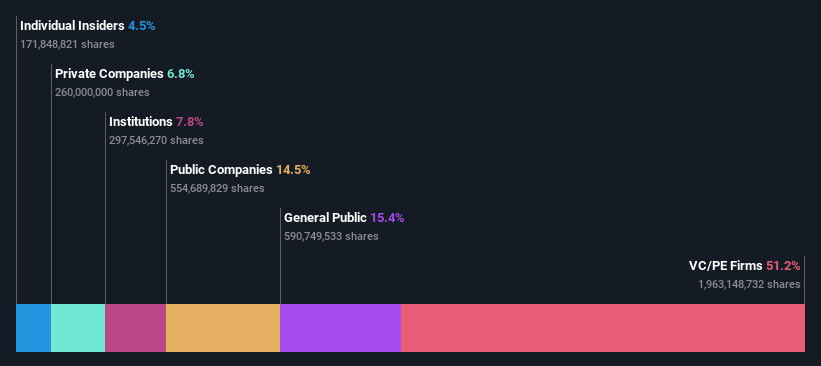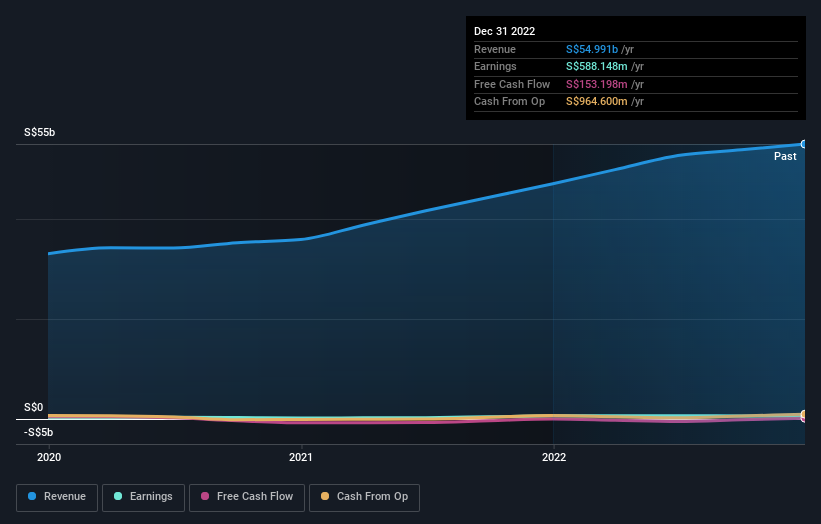- Singapore
- /
- Food and Staples Retail
- /
- SGX:VC2
Private equity firms among Olam Group Limited's (SGX:VC2) largest shareholders, saw gain in holdings value after stock jumped 5.4% last week

Key Insights
- The considerable ownership by private equity firms in Olam Group indicates that they collectively have a greater say in management and business strategy
- 51% of the company is held by a single shareholder (Temasek Holdings (Private) Limited)
- Using data from company's past performance alongside ownership research, one can better assess the future performance of a company
If you want to know who really controls Olam Group Limited (SGX:VC2), then you'll have to look at the makeup of its share registry. With 51% stake, private equity firms possess the maximum shares in the company. Put another way, the group faces the maximum upside potential (or downside risk).
As a result, private equity firms were the biggest beneficiaries of last week’s 5.4% gain.
In the chart below, we zoom in on the different ownership groups of Olam Group.
Check out our latest analysis for Olam Group

What Does The Institutional Ownership Tell Us About Olam Group?
Institutional investors commonly compare their own returns to the returns of a commonly followed index. So they generally do consider buying larger companies that are included in the relevant benchmark index.
Olam Group already has institutions on the share registry. Indeed, they own a respectable stake in the company. This implies the analysts working for those institutions have looked at the stock and they like it. But just like anyone else, they could be wrong. When multiple institutions own a stock, there's always a risk that they are in a 'crowded trade'. When such a trade goes wrong, multiple parties may compete to sell stock fast. This risk is higher in a company without a history of growth. You can see Olam Group's historic earnings and revenue below, but keep in mind there's always more to the story.

Olam Group is not owned by hedge funds. The company's largest shareholder is Temasek Holdings (Private) Limited, with ownership of 51%. This implies that they have majority interest control of the future of the company. In comparison, the second and third largest shareholders hold about 14% and 6.8% of the stock. Additionally, the company's CEO Sunny George Verghese directly holds 4.4% of the total shares outstanding.
While studying institutional ownership for a company can add value to your research, it is also a good practice to research analyst recommendations to get a deeper understand of a stock's expected performance. We're not picking up on any analyst coverage of the stock at the moment, so the company is unlikely to be widely held.
Insider Ownership Of Olam Group
The definition of an insider can differ slightly between different countries, but members of the board of directors always count. Company management run the business, but the CEO will answer to the board, even if he or she is a member of it.
I generally consider insider ownership to be a good thing. However, on some occasions it makes it more difficult for other shareholders to hold the board accountable for decisions.
We can see that insiders own shares in Olam Group Limited. This is a big company, so it is good to see this level of alignment. Insiders own S$270m worth of shares (at current prices). It is good to see this level of investment by insiders. You can check here to see if those insiders have been buying recently.
General Public Ownership
The general public-- including retail investors -- own 15% stake in the company, and hence can't easily be ignored. While this size of ownership may not be enough to sway a policy decision in their favour, they can still make a collective impact on company policies.
Private Equity Ownership
Private equity firms hold a 51% stake in Olam Group. This suggests they can be influential in key policy decisions. Some might like this, because private equity are sometimes activists who hold management accountable. But other times, private equity is selling out, having taking the company public.
Private Company Ownership
Our data indicates that Private Companies hold 6.8%, of the company's shares. It might be worth looking deeper into this. If related parties, such as insiders, have an interest in one of these private companies, that should be disclosed in the annual report. Private companies may also have a strategic interest in the company.
Public Company Ownership
Public companies currently own 14% of Olam Group stock. This may be a strategic interest and the two companies may have related business interests. It could be that they have de-merged. This holding is probably worth investigating further.
Next Steps:
It's always worth thinking about the different groups who own shares in a company. But to understand Olam Group better, we need to consider many other factors. For example, we've discovered 2 warning signs for Olam Group (1 doesn't sit too well with us!) that you should be aware of before investing here.
Of course this may not be the best stock to buy. Therefore, you may wish to see our free collection of interesting prospects boasting favorable financials.
NB: Figures in this article are calculated using data from the last twelve months, which refer to the 12-month period ending on the last date of the month the financial statement is dated. This may not be consistent with full year annual report figures.
New: AI Stock Screener & Alerts
Our new AI Stock Screener scans the market every day to uncover opportunities.
• Dividend Powerhouses (3%+ Yield)
• Undervalued Small Caps with Insider Buying
• High growth Tech and AI Companies
Or build your own from over 50 metrics.
Have feedback on this article? Concerned about the content? Get in touch with us directly. Alternatively, email editorial-team (at) simplywallst.com.
This article by Simply Wall St is general in nature. We provide commentary based on historical data and analyst forecasts only using an unbiased methodology and our articles are not intended to be financial advice. It does not constitute a recommendation to buy or sell any stock, and does not take account of your objectives, or your financial situation. We aim to bring you long-term focused analysis driven by fundamental data. Note that our analysis may not factor in the latest price-sensitive company announcements or qualitative material. Simply Wall St has no position in any stocks mentioned.
About SGX:VC2
Olam Group
Engages in the sourcing, processing, packaging, and merchandising of agricultural products worldwide.
Moderate second-rate dividend payer.
Similar Companies
Market Insights
Community Narratives




